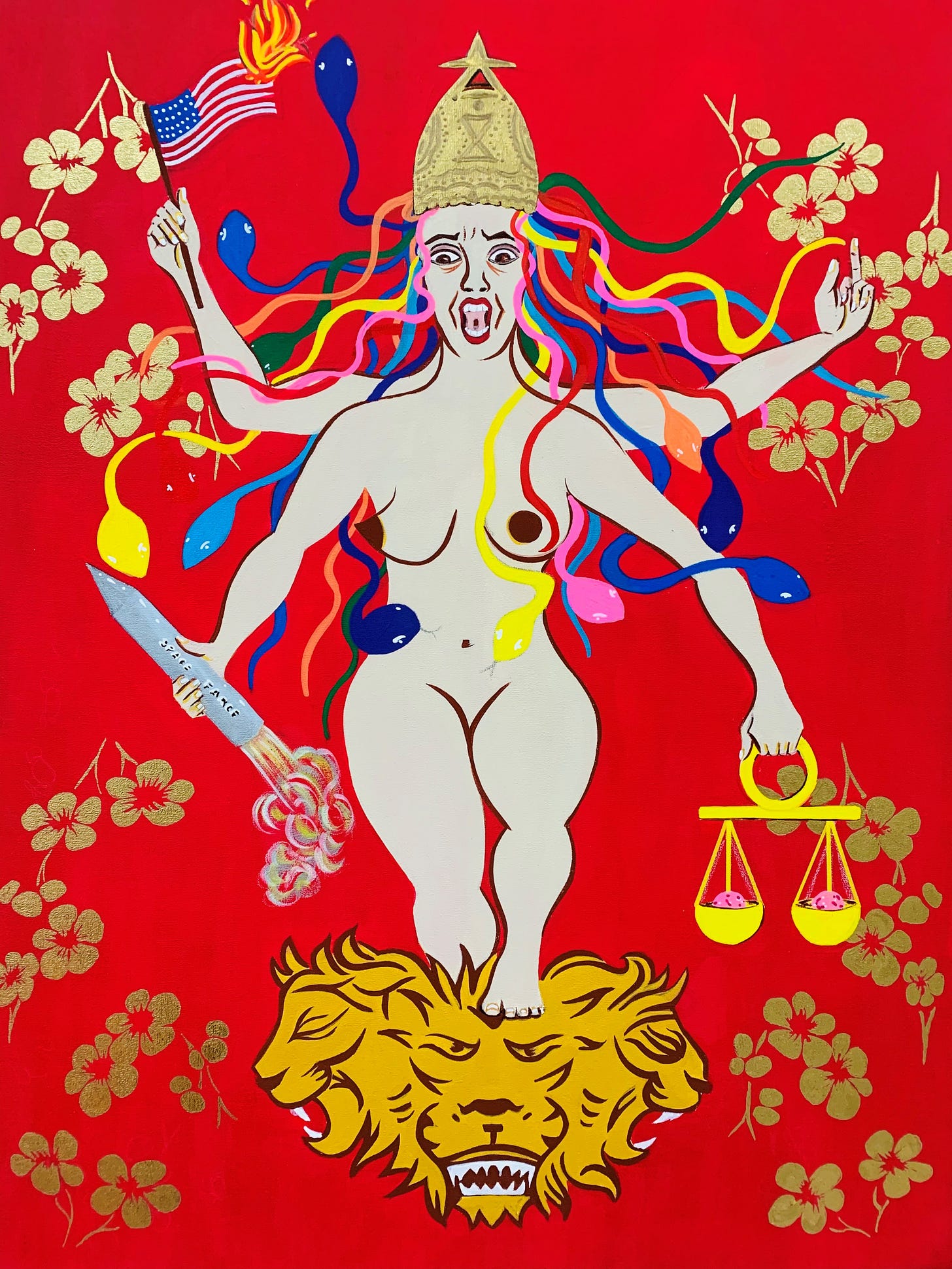Vibrant vulva landscapes, poster-style paintings of women giving birth, and multichromatic ovaries and fallopian tubes adorn the walls of Shima Star’s solo exhibition Too Controversial at Studio 103 Gallery in Seattle, WA. This collection explores women’s experiences — from pregnancy to media portrayal. It celebrates women’s contributions and challenges societal limitations. But this show almost didn’t happen.
Raised in multicultural London in the 1980s and 90s, Star's life was deeply influenced by her parents' traditional values. Her parents, who are of Indian descent, immigrated to London after Idi Amin expelled all Asians from Uganda in 1972. And like most immigrant parents, they wanted to ensure their daughter’s success in their adopted country by guiding her towards the ‘right’ path, which excluded art.
“So, I grew up in a very strict household, to the point of the usual kinds of stories that we hear with people — artists who are first-generation immigrants, children of first-generation immigrants, so to speak, because we're not allowed to be artists, this isn't usually an option or choice given to us,” said Shima Star. “And I grew up in a bit of a very similar way, similar stories in the sense of ‘be an accountant or be a lawyer, be a doctor.’ And I was never going to be any of those things. I knew from a really young age that I was never going to be any of those things. And I wasn't allowed to paint and draw at home, I wasn't allowed to do that at all, the only place I was able to do that was at school.”
Growing up, Star lived a double life. At school she would draw and paint and take art classes, but she had to hide it from her parents. She wasn’t even allowed to bring art supplies into the family home. And when it came time to take final exams when she was 16 years old, she intentionally failed many of them so her parents would allow her to study art instead of law, medicine or some other traditional profession. She didn’t tell her mother the truth of what she’d done until 2022. She did attend art school, but even as her skills improved her mother insisted that she conceal her nude paintings from her father.
To learn more about Shima Star’s Too Controversial exhibition, join us on Saturday, September 30, 2023. We will being doing an in-person artist talk with Star at 3pm at Studio 103 Gallery, 306 S Washington St #103, Seattle, WA 98104. The event is free and open to the public.
“I felt a lot of shame around it,” Star said, “a tremendous amount of shame around it for a very long time. But during the pandemic, I was able to find a really great community and talk about it and understand that I'm not alone with these stories.”
For much of her adulthood, Star prioritized her marriage and raising her daughter over her artistic aspirations. But in 2017, she heeded the siren call to creativity and returned to the art world, adopting the pseudonym 'Shima Star.'
“My artist name is Shima star,” she said. “And there's a reason why I adopted the star symbol as a surname. Initially, I questioned, who's doing the work here? Is it me? Is it my husband? Is it my father? And I really wanted to have ownership over who I am and the work that I do. So, I adopted ‘Star’ as my artist name, and it symbolizes the rejection of patriarchy; but also it’s a form of self-empowerment.”
After returning to her art practice, she painted her first female nudes during the pandemic. Star’s namesake, Queen Shima, the 17th century ruler of the Kalingga Kingdom (modern day Indonesia), was the first subject in her Red series which depicted goddesses in the nude form. Star clarified that while Queen Shima wasn’t considered a goddess in her lifetime, because of her power and the good she did, Star and some others in her culture now worship her as a goddess. Queen Shima instilled a culture of radical honesty in 17th century Kalingga by introducing strict laws against thievery, a history that Star felt reflected the spirit of our current times.
“It would have been early 2020 when the election results were coming through,” said Star. “And I needed to process it because it was just such a significant moment. And really speak up for the voices that actually saved democracy. And it was BIPOC women that saved democracy in that moment. They're the ones that came out in force to vote. And we have the Democratic Party in place right now. And no one was really shouting about and celebrating that fact. But that piece was in response to that moment in time.”
In her current series, Too Controversial, Shima Star aims to recognize, celebrate, and scrutinize the often-thankless roles women are tasked with in society. But she also wants to do that without apology, without shame, and with a boldness that has taken many years to cultivate.
“I feel that I've presented a body of work that talks about empowerment,” Star said, “and presents our bodies as something incredibly beautiful and powerful. Yet, there are also works there that make you question what it means to be a woman. So, I hope that I'm talking about the experiences that we have to live through, you know, becoming pregnant, not becoming pregnant, being forced to have children, being raped. Then our bodies being idolized by media. And then you know, ‘you're not diverse enough,’ ‘you're diverse enough.’ There are so many confusing elements when it comes to womanhood. And I hope that I brought that conversation to the table.”
Star adds that “it takes courage to do this,” and that she’s been sitting on the series for four years because she was afraid of rejection. That fear wasn’t unfounded. Star has faced rejection for the most banal reasons such as a professor disliking her use of color.
“I thought that was a cultural hit,” said Star. “Why are you hating on what I see every day? My culture is rich with colors: the clothes that we wear, the Holi celebrations, it's all about color. So, when you get hits like that, and you know that it's coming from a certain demographic in a position of power, it's hard, it's hard to—” She trails off a bit, then continues. “I just knew at that point that I had to stick two fingers up at what people were saying to me and just continue. This is what I am, whether people understand me or not.”
However, Star's experience with rejection isn’t limited to those outside her community. When she was searching for a gallery to show her current series, a South Asian gallerist said the work was too controversial, which is how the series got its name.
“As I was giving her a studio tour, she saw the Women at Work and the Virgin Landscapes and said, ‘Oh, no, these are too controversial.’ And I couldn't believe it. I thought, we're in the 21st century. I'm a South Asian woman, speaking up on women's rights, and doing this through my body of work, and I have an Indian gallerist, who I thought would be in alliance, tell me that my work was too controversial. I was in shock. I thought, ‘Oh, my God, I can't believe that this is happening.’ Obviously, that hasn't culminated to anything. But I can see this in two ways: I can take this on board and present myself and present this body of work in the way that I’m been seeing and in the way it's being seen. And so, I've taken it on board and said, ‘Hey, this is what I'm going to call my work, if you're finding it to be controversial, then it is too controversial, for you.’”
While Star embraces the 'too controversial' label for her art, she clarifies that there is a distinction between her work and erotica. This distinction influenced her decision to title her female anatomy pieces Virgin Landscapes.
“It’s really important to me that my work is not seen as erotic art,” Star said, “or highly sexualized or seen as porn or any of those kinds of things. It's really about seeing the beauty of our bodies, connecting it to nature, connecting it to Mother Earth. Mother Earth births us, feeds us, cherishes us, loves us, nourishes us. And I want our bodies to be seen as something that is incredibly beautiful and an important part of life.”
In Star’s Women at Work series the figures’ legs and arms are cutoff, evoking a sense of fragmentation and disembodiment.
“The Women at Work [series] also talks about forced labor,” Star said. “I wanted to give the sense of a factory setting, a mechanical setting, and the conflicts that come from something that's meant to be the natural world. And it's all meant to be the natural world. We're part of the natural world. But in this context, it's about these women not having autonomy over their bodies. The loss of control, becoming baby-making machines, and that’s who you are. You have no power at that point.”
For Shima Star, Too Controversial is more than just an exhibition; it's a platform to continue the dialogue and spotlight the resilience and vulnerabilities of women in society. And it’s a conversation that she believes should be ongoing if women’s humanity is to be respected in practice and in law.
“You know, we're six months after the women's month that happens once a year, and people talk about women for two days,” said Star. “And then it's over and done with. And being able to bring that conversation back to the table six months into the year, six months before we get to the next women's month in 2024, to continue to have these conversations. I sit here and I think, how blessed and lucky am I to be in this space and to be able to make this work. Then I think about the women, and it's not even hundreds, it’s not even thousands, it's billions of women whose human rights are being rolled back as we speak, around the world. Who don't have the right to vote. Who don't have the option to go out in a skirt or in a top that shows their midriff. Actually, that's something I was talking to another Indian woman about, the confusion within our own culture. It's okay, if you're wearing a sari to have your midriff showing, but to wear pants and a crop top, that's not okay. So, all of these kinds of things that make women feel insecure about who they are and their bodies. And we're continuously being told through media or through word-of-mouth or old wives’ tales. It just continuously reminds us of things that we need to keep fighting for and saying, ‘hey, it's not just about me, if the rights of women are being rolled back in the USA, what happens to the rest of the world?’”
To learn more about Shima Star’s Too Controversial exhibition, join us on Saturday, September 30, 2023 at 3pm. I will host an in-person artist talk with Shima Star at at Studio 103 Gallery, 306 S Washington St #103, Seattle, WA 98104. The event is free and open to the public.
















